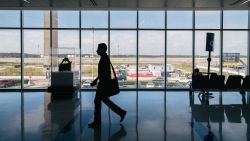The percentage of the adult population not working because of Covid-related reasons tripled between December and January, according to Goldman Sachs.
The Wall Street bank, citing the latest Household Pulse Survey of roughly 75,000 respondents from the Census Bureau, said the share of adults not working due to virus-related reasons jumped from 1.2% in December to 3.5% in January.
Mark Zandi, chief economist at Moody’s Analytics, pointed out on Twitter that the survey shows a staggering 12 million people were “not working because they were sick with the virus, taking care of someone who was, or were fearful of getting sick.”
The survey, done in the first 10 days of January, is “more evidence of the economic damage Omicron is doing,” Zandi said.
The rapid spread of Omicron has caused significant disruptions in recent weeks by getting workers sick and forcing others to quarantine. Everything from garbage collection and emergency services to airlines has been interrupted.
“Employers with public-facing workers, like schools and emergency service providers, appear to have had particularly large shares of their labor force isolate due to the virus,” Goldman Sachs economists wrote in the report.
Between December 27 and January 7, an average of 8% of flights were canceled each day, Goldman Sachs said. However, flight cancellations have eased recently prior to weather-related issues, “suggesting a diminishing impact from worker absenteeism,” the report said.
Meanwhile, Omicron is causing Americans to shift their behavior, dealing a blow to Covid-sensitive sectors of the economy.
“Activity in virus-sensitive services has declined sharply over the last month,” Goldman Sachs said.
For instance, air travel has slowed down. The number of passengers processed at airports by the Transportation Security Administration has dropped to about 72% of the level of two years ago, compared with 84% in November, according to Goldman Sachs.
Both American Airlines and United Airlines warned this week of reduced demand due to Omicron. “While Omicron is impacting near term demand, we remain optimistic about the spring and excited about the summer and beyond,” said United Airlines CEO Scott Kirby said.
OpenTable’s tracking of seated diners at restaurants has declined by a similar margin, Goldman Sachs said.
























